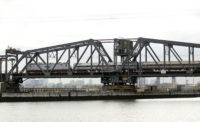Highways
Sinkholes Close Key NJ Interstate-80 As Officials Seek Solutions, Funding

Repair intensifies of roadway sinkholes, one measuring 40 ft x 40 ft, on normally busy but now closed east-west Interstate-80 in western New Jersey; state officials seek longer term solutions and funding for growing threat caused by voids in nearly 600 legacy abandoned iron mines.
Credit: © Thomas P. Costello / USA TODAY Network / USA TODAY NETWORK via Imagn Images
Sinkholes likely resulting from collapsing vestiges of New Jersey’s long-shuttered iron mining industry are causing historical headaches for state officials—now closing one heavily used interstate link to New York City and heightening fears of further subsidence along major highways in the immediate area.
The spate of sinkholes began last December, when a 40-ft x 40-ft depression appeared in the right shoulder of eastbound Interstate-80 near the State Route 15 interchange in Morris County. On Feb. 10, a 11x11-ft, 4-ft deep sinkhole formed 75 ft away, in the highway’s center lane, forcing a detour of all eastbound traffic around the area. After testing revealed what the New Jersey Dept. of Transportation called “a significant void” under the area, a geotechnical assessment identified 90 possible areas of instability or voids under the interstate. The agency initiated drilling and grouting operations to determine areas requiring more extensive repairs.
Five weeks later, however, a new sinkhole, measuring 15x15 ft, opened in the median of a nearby I-80 work zone. That incident forced indefinite closure of the interstate's westbound lanes pending an evaluation of highway integrity and repair needs.

New Jersey has mapped locations of about 590 now closed iron mines, and others across several northern counties, which started operating in the 18th century and have left voids that are causing sinkholes under Interstat-80 and threaten other key roadways.
Credit: New Jersey Office of GiS
Another Morris County sinkhole, apparently unrelated to the I-80 issues, appeared on March 21 in the left shoulder of nearby northbound I-287, closing two lanes of traffic. Believed to be the result of a collapsed drainage pipe, that depression was repaired shortly after, NJDOT says.
The primary contractor for the I-80 work is IEW Construction Group, Hamilton, N.J., with geotechnical drilling being performed by the Keller Group. Those firms and geotechnical consultant HNTB are working under emergency/on-call contracts, the agency confirmed.
Agency officials also have directed inspections of its bridges near the sinkholes, including those going over Route 15. “There is deterioration of the concrete cover on the bridge piers that is the result of natural bridge aging, and not related to the emergent I-80 sinkhole and the ongoing repairs,” said an NJDOT spokesman. Maintenance repairs to concrete on I-80 bridges over Route 15 will be carried out in conjunction with the interstate sinkhole repairs, he noted, with measuring instruments installed on the bridges to detect any movement or settlement.
He said on March 13 that the agency is “working closely with engineering and mine experts and our federal partners to further assess subsurface conditions, including the influence of abandoned mines.
Subsurface strains
The I-80 sinkholes have brought new attention to the nearly 600 abandoned iron mines underlying nine northern New Jersey counties that dates to the early 1700s but with most operations shut down since 1970. The problematic section of I-80 was constructed in 1960. New Jersey led the nation in iron ore production until the Lake Superior deposits in Michigan were discovered.
Other sinkholes caused by old mines have opened over the years but the ones affecting I-80 are the first to cause a major highway shutdown. The interstate handles about 130,000 vehicles daily, according to state statistics.
Still, a 2020 update to Morris County’s hazard mitigation plan notes that widespread subsidence has accompanied area development, as “many of the surface openings were improperly filled in, and roads and structures have been built adjacent to or on top of these former mine sites.”
The likely culprit for the I-80 sinkholes is the Mount Pleasant Mine, which opened in 1786 near the highway’s current localion. During 110 years of operation, it extracted nearly 400,000 tons of magnetite ore from the vicinity of the sinkholes using a now-antiquated technique called underhand stoping, in which a block of ore is extracted from the top downward.
“That means the top of the void could be as little as 100 feet from the surface,” says Robert Denton, Jr., a senior geologist for consultant Terracon based in Ashburn, Va.. “Taking out that much ore would create an enormous void.”
Denton, who is not involved with NJDOT’s geotechnical assessments, speculates that the most recent subsidence may result from a repeated cycle of wet and dry weather extremes. “This would cause a pumping effect that would cause significant variations in the area’s groundwater level,” he adds.
Since New Jersey’s last active mine closed nearly 40 years ago, the state agency has enlisted mining experts from Pennsylvania and other states to assist in developing a strategy to avert additional sinkholes on I-80 and nearby heavily traveled roadways. One factor working in its favor is that most of the region’s mine network has been extensively mapped, says Denton.
“This can help identify locations where shafts intersect or come near roadways, and set up appropriate testing measures,” he adds.
NJDOT says repairs to I-80’s eastbound lanes will require about two months. Once drilling and grouting work is completed in mid-April, the repair strategy calls for excavating the area, installing a base of large stone with a wire mesh on top and adding more stone and concrete layers. Additional fill and soil will be placed on top of the concrete and compacted stone before several layers of asphalt are applied. Crews also will install monitoring systems at various locations to track surface and underground conditions.
After the second sinkhole developed, NJDOT said it was considering a plan to build a crossover for truck traffic to temporarily keep it away from local roadway detours while larger repair work was ongoing. At the time, it predicted I-80 eastbound lanes would be closed for at least two months.
No timeline has been set for repair and reopening of I-80 westbound lanes.
State Gov. Phil Murphy (D) in February declared a state of emergency for Morris County and has applied for emergency funding from the Federal Highway Administration related to serious damage due to a natural disaster or another external cause.
At a March 22 site visit, U.S. Transportation Secretary Sean Duffy told media that repair funding would be provided but he did not specify an amount. “I’ll do all we can to get the resources,” he said. “We’re providing technical assistance. At a later point, we’ll talk about money." Duffy said he may ask the state for legislation to cover gaps in the federal allocation.
Costs for the highway shutdown are more than $150,000 per day, Murphy said.



